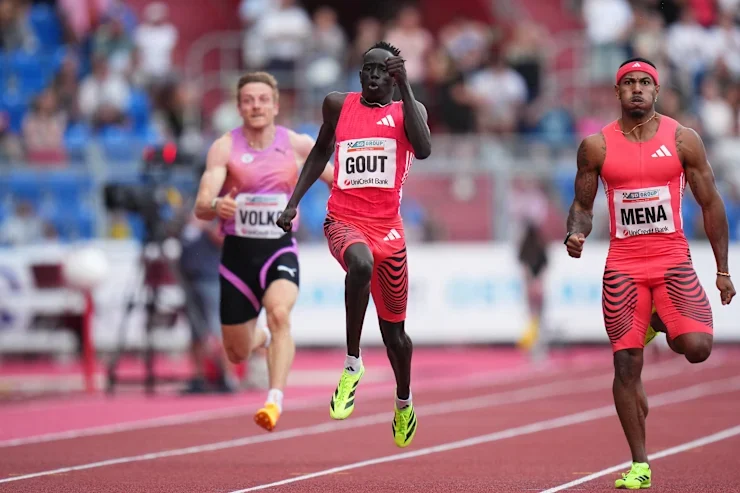Gout Gout Outpaces Cuban Rival, Breaks Record in Stunning Finish

The better the competition, the faster he ran. Indeed, the quicker he moves.
In his first professional competition in Europe against some of the world's finest men, Gout Gout ran faster than any Australian male in the 200 metres.
Gout came close to breaking the 20-second barrier, winning the Ostrava Golden Spike competition in 20.02 seconds with no wind.
That he will soon break 20 seconds is like predicting he will quickly complete year 12. Both events will occur soon. He will most likely surpass the speed milestone before reaching the school level.
"Get some more races in, and it [20 seconds] will definitely drop," Gout remarked after the win.
Gout had to wait until the mid-year school holidays to make his professional racing debut in Europe, but when he finally did in the Czech Republic overnight, he flew.
As much as he had been waiting for the opportunity to compete in Europe against the rest of the world, the rest of the world had been wanting to see this boy in person. Gout's popularity extends beyond Australia.
For a teenager who had never competed in international senior open races, he is already a world figure. He is the buzzer athlete everyone wants to see, to see if the hype is true. They now know what it is.
The pace, the age, the strange moniker, and the unmistakable resemblance to Usain Bolt's running technique - to say nothing of outperforming some of the world's top sprinters at the same age - make a resemblance difficult to ignore and so drew the world's attention. Even Gout and Bolt recognize the similarities.
The event itself, held on Wednesday (AEST), was mature. A strange term for a 17-year-old who had to wait until the year 12 school vacations to fly to Europe and run, yet he raced a calm, mature race. He was not intimidated by the situation; he knew exactly what he needed to do and was confident that if he performed it, he would most likely win.
He already knows his race. He knows his starts are a weakness, but he comes home strong, so if he is within striking distance coming off the bend, he is confident he will win. It was what he expected in Ostrava, and the race followed his plan.
The question was whether he was fit and powerful enough to compete against more experienced runners. He had a fantastic summer, but how much fitter and stronger was he now after just a few months of training - while studying year 12? The answer was emphatic: he is fitter, stronger, and faster.
"I've felt stronger in training these last couple of months and I've felt good since I got to Europe last Thursday," according to Gout.
"I knew Mena [Cuban Reynier Mena] would come hard at me the first 100, but I was confident I'd be close enough to come home strongly in the second part of the race, which is of course my stronger part."
As the runners came around the turn and the stagger evened out, Gout in lane six had gone ahead of the two runners withering on his outside, leaving just Mena ahead of him on his inner lane. At the 100m, Mena gradually opened the gap on Gout for around 10 metres, and it appeared that he might hold Gout off.
But here was the mature bit: Gout appeared more relaxed and confident than Mena. Gout anticipated his arrival, but Mena tensed up as he attempted to strain for the line. By 160m, Gout appeared to have accelerated, but in reality, he was simply maintaining his top-end pace - a remarkable feat late in a 200 - while Mena struck the sand and slowed down. The distance had grown to a metre by the time they arrived at the finish line.
Gout finished in 20.02 seconds, beating Mena in 20.19 and Briton Nethaneel Mitchell-Blake in 20.60.
"I felt calm but strong as I came off the turn and was confident I'd be strong enough to get the win," according to Gout. "Another national record!" Pretty pleased with that; it's not a bad first outing in Europe!"
The result was not only Gout's first European victory but also proof that he is unconcerned mentally or physically about competing in Europe's major races against much older and more experienced runners.
He will now remain in Europe to practice for the Monaco Diamond League's under-23 200m race on July 11.
Gout's European debut in Ostrava, where he set a personal best, added to the perfect synergy with Bolt.
Bolt had the 200m meet record of 19.83 in Ostrava, which he ran as a 21-year-old when Gout was just six months old. That was in 2008, and later that year, Bolt won his first Olympic gold medal.
In his first race in Ostrava as a 19-year-old, Bolt ran 20.28. Of course, while these data signify nothing in terms of Gout's future, they do provide context for how outstanding Gout's performances are when compared to what the world's finest have accomplished.
Gout appreciates the Bolt parallels and is unconcerned about them, as he usually responds: That is good, but I also want to be Gout Gout.
Right now, being gouty is a nice thing.